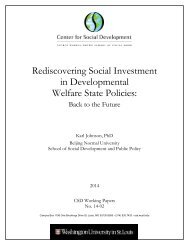Exploring and Assessing Intercultural Competence - Center for ...
Exploring and Assessing Intercultural Competence - Center for ...
Exploring and Assessing Intercultural Competence - Center for ...
You also want an ePaper? Increase the reach of your titles
YUMPU automatically turns print PDFs into web optimized ePapers that Google loves.
Assessment Tools of<br />
<strong>Intercultural</strong> Communicative <strong>Competence</strong><br />
© Alvino E. Fantini, Brattleboro, VT 2006<br />
American Council on the Teaching of Foreign Languages (ACTFL) Proficiency Scale<br />
This scale assesses the level of language attainment achieved. (Liskin-Gasparro, 1982)<br />
Assessment of <strong>Intercultural</strong> <strong>Competence</strong> (AIC)<br />
This self–assessment tool, designed in a YOGA Format (self- <strong>and</strong> other assessment) charts the<br />
development of intercultural sojourners over time, <strong>and</strong> provides normative, <strong>for</strong>mative, <strong>and</strong><br />
summative indicators. (See preliminary version at in the SIT<br />
Occasional Papers Series, Inaugural Issue, Spring 2000, scroll down to pp.25-42, “A Central<br />
Concern: Developing <strong>Intercultural</strong> <strong>Competence</strong>) For a more complete <strong>and</strong> updated version,<br />
2005, contact: alvino.Fantini@sit.edu.<br />
Australian Second Language Proficiency Ratings (ASLPR)<br />
This scale, developed by Ingram <strong>and</strong> Wylie in 1982, groups various components of language<br />
use together in a single b<strong>and</strong> descriptor to assess second language proficiency.<br />
Behavioral Assessment Scale <strong>for</strong> <strong>Intercultural</strong> Communication (BASIC)<br />
Olebe, M., & Koester, J. (1989). <strong>Exploring</strong> the cross-cultural equivalence of the Behavioral<br />
Assessment Scale <strong>for</strong> <strong>Intercultural</strong> Communication. International Journal of <strong>Intercultural</strong><br />
Relations, 13(3), 333-347. Eight scales; validated with 263 university students.<br />
Beliefs, Events, <strong>and</strong> Values Inventory (BEVI)<br />
Craig N. Shealy, PhD. James Madison University shealycn@jmu.edu Designed to identify <strong>and</strong><br />
predict a variety of developmental, affective, <strong>and</strong> attributional processes <strong>and</strong> outcomes that<br />
are integral to Equilintegration Theory (ET), which seeks to explain the processes by which<br />
beliefs, values, <strong>and</strong> ‘worldviews’ are acquired <strong>and</strong> maintained, why their alteration is typically<br />
resisted, <strong>and</strong> how <strong>and</strong> under what circumstances their modification occurs. In context of EI<br />
theory, the BEVI would appear to be highly suitable <strong>for</strong> the assessment of international<br />
learning. Ultimately the BEVI is designed to determine whether, how <strong>and</strong> to what degree<br />
people are (or are likely to be) “open” to various trans<strong>for</strong>mational experiences such as<br />
international education.<br />
http://www.acenet.edu/programs/international/fipse/PDF/BEVI_Abstract.pdf<br />
Counseling Inventory: A self-report measure of multicultural competencies<br />
Journal of Counseling Psychology, 41(2), 137-148. Developed <strong>for</strong> the counseling milieu.<br />
Emphasizes behaviors. Four factors. Large sample.<br />
Cross-Cultural Adaptability Inventory (CCAI)<br />
Dr. Colleen Kelley & Dr. Judith E. Meyers. CCAI is designed to help participants underst<strong>and</strong> the<br />
qualities that enhance cross-cultural effectiveness, whether or not to work in a culturally<br />
diverse company, whether or not to live abroad, <strong>and</strong> how to prepare to enter another culture.<br />
Measurement: The CCAI measures 4 variables: Emotional Resilience, Flexibility <strong>and</strong> Openness,<br />
Perceptual Acuity, <strong>and</strong> Personal Autonomy. <strong>Intercultural</strong> Press 1.800.370.2665<br />
The Cross-Cultural Assessor<br />
A personal navigator <strong>for</strong> successful communication across cultures. This multimedia program<br />
measures, builds <strong>and</strong> manages cross-cultural skills <strong>and</strong> characteristics, through the use of<br />
exercises <strong>and</strong> questionnaires.<br />
http://www.promentor.fi/cca/<br />
Cross-Cultural Counseling Inventory<br />
LaFromboise, T. D., Coleman, H. L., & Hern<strong>and</strong>ez, A. (1991). "Development <strong>and</strong> factor<br />
structure of the Cross-Cultural Counseling Inventory--Revised." Professional Psychology:<br />
Research <strong>and</strong> Practice, 22(5), 380-388. Developed <strong>for</strong> the counseling milieu.<br />
Cross-Cultural Sensitivity Scale (CCSS)<br />
Pruegger, V. J., & Rogers, T. B. (1993). "Development of a scale to measure cross- cultural<br />
sensitivity in the Canadian context." Canadian Journal of Behavioural Science, 25(4), 615-621.<br />
Normed on undergraduate students.<br />
87
















